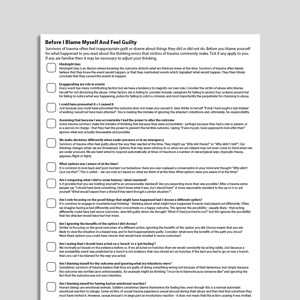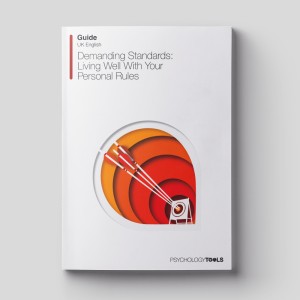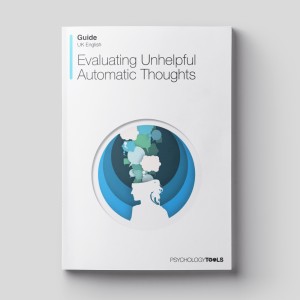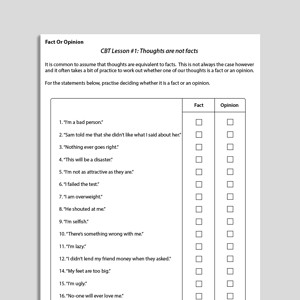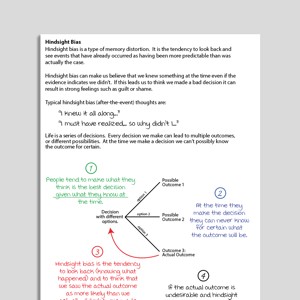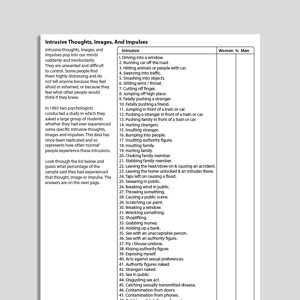Psychoeducation and Information-Giving
Therapeutic techniques such as Socratic questioning aim to help patients to become cognizant of, and to synthesize, information that they already have. However, many patients experience psychological distress because they lack critical information: the essential component of many cognitive models concerns patient’s misappraisals or misperceptions of a stimulus. In cases where patients are lacking critical information then psychoeducation (giving information) is a hugely important psychological intervention.
Psychoeducation can include:
- information given verbally in a therapy session;
- written material in the form of Psychology Tools information handouts, guides, and chapters;
- exercises or homework tasks where patients are encouraged to discover information for themselves.
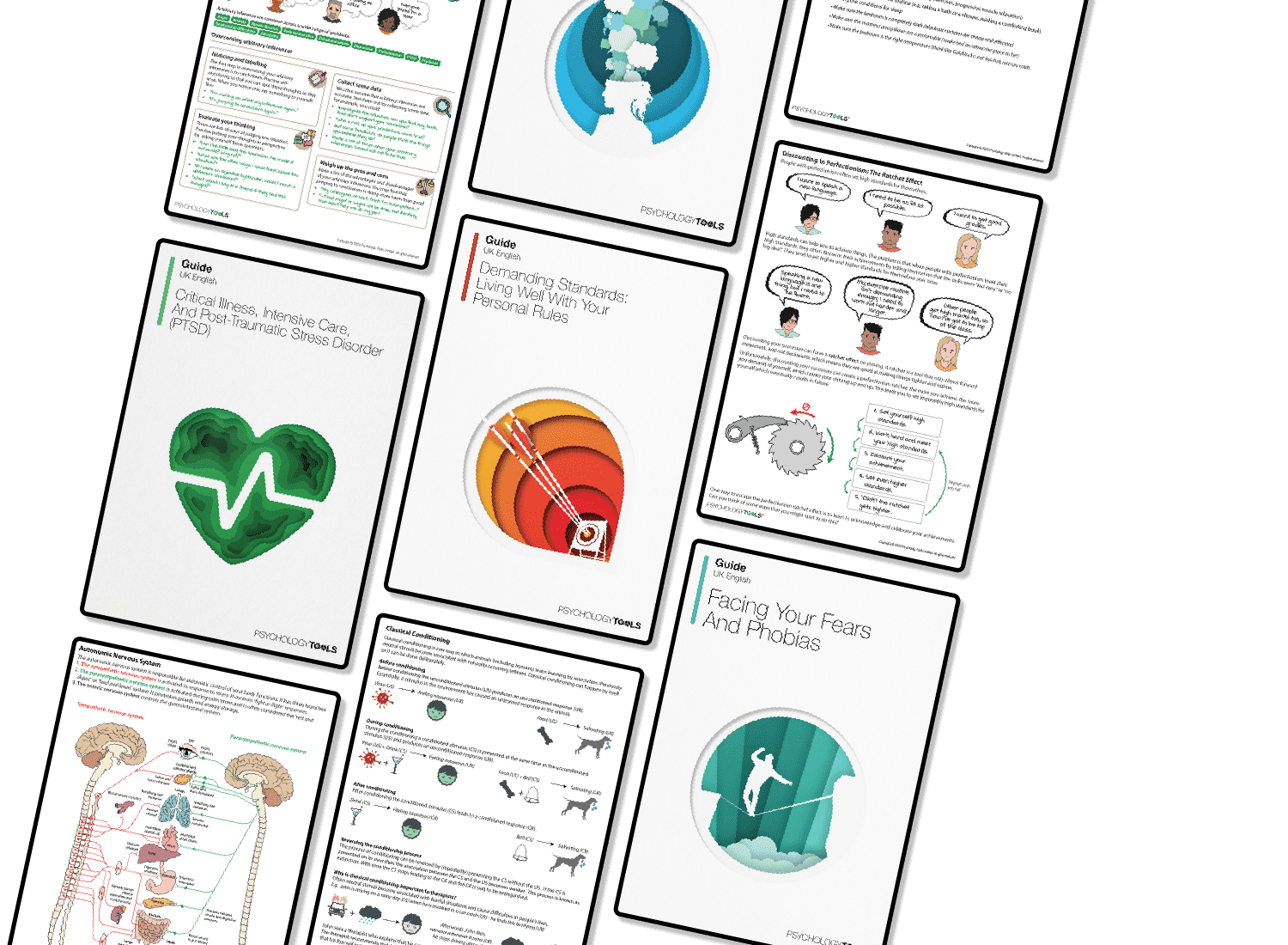
100 of 206 resources
"Should" Statements
“Should” statements (sometimes referred to as ‘musturbation’, ‘necessitous thinking’, ‘self-commands’, and ‘injunctions’) are char ...
https://www.psychologytools.com/resource/should-statements
A Guide To Emotions (Psychology Tools For Living Well)
Cognitive behavioral therapy can help your clients to live happier and more fulfilling lives. Psychology Tools for Living Well is a self-help course ...
https://www.psychologytools.com/resource/a-guide-to-emotions-psychology-tools-for-living-well
Abandonment
Schema therapy posits that psychological difficulties stem from early maladaptive schemas (EMS) and clients’ characteristic responses to them, refer ...
https://www.psychologytools.com/resource/abandonment
All-Or-Nothing Thinking
All-or-nothing thinking (often also referred to as ‘black and white thinking’, ‘dichotomous thinking’, ‘absolutist thinking’, or ‘binary ...
https://www.psychologytools.com/resource/all-or-nothing-thinking
Approval-/Admiration-Seeking
Schema therapy posits that psychological difficulties stem from early maladaptive schemas (EMS) and clients’ characteristic responses to them, refer ...
https://www.psychologytools.com/resource/approval-admiration-seeking
Arbitrary Inference
Arbitrary inference is one of the earliest and broadest cognitive disotortions described in CBT. Beck defines it as "the process of forming an interpr ...
https://www.psychologytools.com/resource/arbitrary-inference
Assertive Communication
Communicating and acting assertively is an interpersonal skill that helps people to maintain healthy relationships, resolve interpersonal conflict, an ...
https://www.psychologytools.com/resource/assertive-communication
Autonomic Nervous System
The autonomic nervous system (ANS) automatically regulates the function of body systems outside of voluntary control. The Autonomic Nervous System han ...
https://www.psychologytools.com/resource/autonomic-nervous-system
Balance
Our sense of balance is the result of a complex system which receives visual, vestibular, and proprioceptive inputs. This Balance client information h ...
https://www.psychologytools.com/resource/balance
Barriers Abusers Overcome In Order To Abuse
Individuals who have experienced abuse often focus on their own actions (or inactions) and blame themselves for their own abuse. This client informati ...
https://www.psychologytools.com/resource/barriers-abusers-overcome-in-order-to-abuse
Before I Blame Myself And Feel Guilty
Guilt is a common post-traumatic reaction and is often the result of cognitive bias. This CBT worksheet explores common cognitive biases that have bee ...
https://www.psychologytools.com/resource/before-i-blame-myself-and-feel-guilty
Behaviors In Panic (Psychology Tools For Overcoming Panic)
Psychology Tools for Overcoming Panic takes a cognitive behavioral therapy (CBT) approach to this common anxiety problem. This chapter discusses beha ...
https://www.psychologytools.com/resource/behaviors-in-panic-psychology-tools-for-overcoming-panic
Body Sensations In Panic (Psychology Tools For Overcoming Panic)
Psychology Tools for Overcoming Panic takes a cognitive behavioral therapy (CBT) approach to this common anxiety problem. This chapter discusses body ...
https://www.psychologytools.com/resource/body-sensations-in-panic-psychology-tools-for-overcoming-panic
Breathing To Calm The Body Sensations Of Panic (Psychology Tools For Overcoming Panic)
Psychology Tools for Overcoming Panic takes a cognitive behavioral therapy (CBT) approach to this common anxiety problem. This chapter discusses the ...
https://www.psychologytools.com/resource/breathing-to-calm-the-body-sensations-of-panic-psychology-tools-for-overcoming-panic
Catastrophizing
The Catastrophizing information handout forms part of the cognitive distortions series. It is designed to help clients and therapists to work more eff ...
https://www.psychologytools.com/resource/catastrophizing
Challenging Your Negative Thinking (Archived)
NOTE: An improved version of this resource is available here: Evaluating Unhelpful Automatic Thoughts. Older versions of a resource may be archived in ...
https://www.psychologytools.com/resource/challenging-your-negative-thinking
Checking Certainty And Doubt
Psychologists have discovered interesting relationships between Checking, Certainty, And Doubt. This information handout contains an exercise helpful ...
https://www.psychologytools.com/resource/checking-certainty-and-doubt
Checklist For Better Sleep
Some sleep experts recommend that sleep hygiene issues be attended to as one component of treatment for poor sleep. This sleep hygiene worksheet is in ...
https://www.psychologytools.com/resource/checklist-for-better-sleep
Classical Conditioning
Classical conditioning is a process by which stimuli become associated with responses. This information handout describes key principles of Classical ...
https://www.psychologytools.com/resource/classical-conditioning
Coercive Methods For Enforcing Compliance
Individuals who have experienced abuse often focus on their own actions (or inactions) and blame themselves for their own abuse. This client informati ...
https://www.psychologytools.com/resource/coercive-methods-for-enforcing-compliance
Cognitive Distortions – Unhelpful Thinking Styles (Common)
Cognitive distortions (or ‘unhelpful thinking styles’) are ways that our thoughts become biased. Different cognitive biases are associated with di ...
https://www.psychologytools.com/resource/cognitive-distortions-unhelpful-thinking-styles-common
Cognitive Distortions – Unhelpful Thinking Styles (Extended)
Cognitive distortions (or ‘unhelpful thinking styles’) are ways that our thoughts become biased. Different cognitive biases are associated with di ...
https://www.psychologytools.com/resource/cognitive-distortions-unhelpful-thinking-styles-extended
Coping Styles And Responses (Schema Therapy)
Schema therapy posits that psychological difficulties stem from early maladaptive schemas (EMS) and clients’ characteristic responses to them, refer ...
https://www.psychologytools.com/resource/coping-styles-and-responses-schema-therapy
Core Belief Magnet Metaphor
Core beliefs (schemas) are self-sustaining. They act to 'attract' confirmatory evidence and 'repel' (or distort) disconfirmatory evidence. This inform ...
https://www.psychologytools.com/resource/core-belief-magnet-metaphor
Critical Care And PTSD
The Critical Care And PTSD information handout is designed to help clients to learn about the properties of critical care that can increase the likeli ...
https://www.psychologytools.com/resource/critical-care-and-ptsd
Critical Illness Intensive Care And Post-Traumatic Stress Disorder (PTSD)
This is a free guide designed for people who have spent time in an intensive care unit and are experiencing symptoms of post-traumatic stress disorder ...
https://www.psychologytools.com/resource/critical-illness-intensive-care-and-post-traumatic-stress-disorder-ptsd
Defectiveness
Schema therapy posits that psychological difficulties stem from early maladaptive schemas (EMS) and clients’ characteristic responses to them, refer ...
https://www.psychologytools.com/resource/defectiveness
Demanding Standards – Living Well With Your Personal Rules
Demanding Standards – Living Well With Your Personal Rules is a guide written for clients who have high or perfectionistic standards which cause th ...
https://www.psychologytools.com/resource/demanding-standards-living-well-with-your-personal-rules
Discounting In Perfectionism – The Ratchet Effect
When individuals with perfectionism successfully meet their demanding standards, these accomplishments are often discounted as “easy to do,” “no ...
https://www.psychologytools.com/resource/discounting-in-perfectionism-the-ratchet-effect
Disqualifying Others
This Disqualifying Others information handout forms part of the cognitive distortions series, designed to help clients and therapists to work more eff ...
https://www.psychologytools.com/resource/disqualifying-others
Disqualifying The Positive
This Disqualifying the Positive information handout forms part of the cognitive distortions series, designed to help clients and therapists work more ...
https://www.psychologytools.com/resource/disqualifying-the-positive
Eating And Your Energy Levels
The Eating and Your Energy Levels handout provides an overview of the relationship between food intake and energy levels. It graphically illustrates h ...
https://www.psychologytools.com/resource/eating-and-your-energy-levels
Embracing Uncertainty
Intolerance of uncertainty (IU) was first described in individuals suffering from Generalized Anxiety Disorder (GAD). Many behaviors associated with G ...
https://www.psychologytools.com/resource/embracing-uncertainty
Emotional Deprivation
Schema therapy posits that psychological difficulties stem from early maladaptive schemas (EMS) and clients’ characteristic responses to them, refer ...
https://www.psychologytools.com/resource/emotional-deprivation
Emotional Inhibition
Schema therapy posits that psychological difficulties stem from early maladaptive schemas (EMS) and clients’ characteristic responses to them, refer ...
https://www.psychologytools.com/resource/emotional-inhibition
Emotional Reasoning
The Emotional Reasoning information handout forms part of the cognitive distortions series, designed to help clients and therapists to work more effec ...
https://www.psychologytools.com/resource/emotional-reasoning
Emotions
Many people find it hard to label their emotional states or reactions. This information handout provides a list of emotions, categorizing them as basi ...
https://www.psychologytools.com/resource/emotions
Emotions In Panic (Psychology Tools For Overcoming Panic)
Psychology Tools for Overcoming Panic takes a cognitive behavioral therapy (CBT) approach to this common anxiety problem. This chapter discusses the ...
https://www.psychologytools.com/resource/emotions-in-panic-psychology-tools-for-overcoming-panic
Emotions Motivate Actions
Many clients find it helpful to recognize the range of actions that are motivated by different emotional states. This worksheet encourages clients to ...
https://www.psychologytools.com/resource/emotions-motivate-actions
Evaluating Unhelpful Automatic Thoughts
The Evaluating Unhelpful Automatic Thoughts guide is written for clients who struggle with negative automatic thoughts. It provides a comprehensive in ...
https://www.psychologytools.com/resource/evaluating-unhelpful-automatic-thoughts
Everyday 'Unusual' Experiences
Everyone has powerful experiences from time to time, and there are many very ordinary reasons why people have experiences that are considered ‘unusu ...
https://www.psychologytools.com/resource/everyday-unusual-experiences
Examining Your Negative Thoughts
Cognitive restructuring is an evidence-based intervention that involves identifying, evaluating, and modifying maladaptive cognitions, including negat ...
https://www.psychologytools.com/resource/examining-your-negative-thoughts
Exercise For Mental Health
Exercise is an evidence-based treatment for depression and anxiety and research suggests that, in the treatment of depression, exercise interventions ...
https://www.psychologytools.com/resource/exercise-for-mental-health
Exposures For Fear Of Appearing Anxious
Concerns about appearing anxious in front of others plays a central role in social anxiety. Exposure is an effective treatment for tackling these fear ...
https://www.psychologytools.com/resource/exposures-for-fear-of-appearing-anxious
Externalizing
The Externalizing information handout forms part of the cognitive distortions series, designed to help clients and therapists to work more effectively ...
https://www.psychologytools.com/resource/externalizing
Facing Your Fears And Phobias
The Facing Your Fears And Phobias guide is written for clients who struggle with fears or phobias. It provides comprehensive information about what fe ...
https://www.psychologytools.com/resource/facing-your-fears-and-phobias
Fact Or Opinion
One cognitive error which commonly results in distress is to act on our opinions as though they were facts. This CBT exercise helps clients to practic ...
https://www.psychologytools.com/resource/fact-or-opinion
Fair Fighting Rules For Resolving Conflict
Fair fighting is a collection of rules that individuals can use to manage conflict effectively, so that it is ‘fair’ and works towards a resolutio ...
https://www.psychologytools.com/resource/fair-fighting-rules-for-resolving-conflict
Fight or Flight (CYP)
The Fight Or Flight (CYP) information handout has been specifically designed for younger children and includes carefully simplified language. The prof ...
https://www.psychologytools.com/resource/fight-or-flight-cyp
Fight Or Flight Response
The fight or flight response is an automatic physiological reaction to an event that is perceived as stressful or frightening. The perception of threa ...
https://www.psychologytools.com/resource/fight-or-flight-response
Fortune Telling
The Fortune Telling information handout forms part of the cognitive distortions series, designed to help clients and therapists to work more effective ...
https://www.psychologytools.com/resource/fortune-telling
Grounding Techniques
Individuals who have experienced trama often find it difficult to stay within the 'window of tolerance'. Grounding techniques (which can be sensory/pe ...
https://www.psychologytools.com/resource/grounding-techniques
Guidelines For Better Sleep
Some sleep experts recommend that sleep hygiene issues be attended to as one component of treatment for poor sleep. This sleep hygiene information wor ...
https://www.psychologytools.com/resource/guidelines-for-better-sleep
Habituation
The Habituation information sheets are designed to help clinicians to explain the concept of habituation and its role in exposure therapy. The handout ...
https://www.psychologytools.com/resource/habituation
Health Anxiety Formulation
Health anxiety is characterized by a preoccupation with having or acquiring a serious illness, and a high level of anxiety about health. People with h ...
https://www.psychologytools.com/resource/health-anxiety-formulation
Hindsight Bias
Hindsight bias describes the tendency that people have – once an outcome is known – to believe that they predicted (or could have predicted) an ou ...
https://www.psychologytools.com/resource/hindsight-bias
Hindsight Bias (Archived)
Survivors of loss or trauma often think "If only …". Hindsight Bias is a cognitive bias / cognitive illusion which makes events seem more predictabl ...
https://www.psychologytools.com/resource/hindsight-bias-archived
How Breathing Affects Feelings
Normal, anxious, and exercise breathing have significant effects upon our physiology and our emotions. This information handout explains the physiolog ...
https://www.psychologytools.com/resource/how-breathing-affects-feelings
How Is Panic Disorder Different From A Panic Attack? (Psychology Tools For Overcoming Panic)
Psychology Tools for Overcoming Panic takes a cognitive behavioral therapy (CBT) approach to this common anxiety problem. This chapter disambiguates ...
https://www.psychologytools.com/resource/how-is-panic-disorder-different-from-a-panic-attack-psychology-tools-for-overcoming-panic
How Much Do You Know About Panic? (Psychology Tools For Overcoming Panic)
Psychology Tools for Overcoming Panic takes a cognitive behavioral therapy (CBT) approach to this common anxiety problem. This chapter includes a qui ...
https://www.psychologytools.com/resource/how-much-do-you-know-about-panic-psychology-tools-for-overcoming-panic
How Trauma Can Affect You (CYP)
Trauma can result in a wide variety of symptoms, experiences, and behaviors. As well as post-traumatic stress disorder (PTSD), prevalence rates of oth ...
https://www.psychologytools.com/resource/how-trauma-can-affect-you-cyp
How We Hear Sounds
Clients with tinnitus often have a very medicalized understanding of their condition. Understanding the processing steps involved in normal hearing ca ...
https://www.psychologytools.com/resource/how-we-hear-sounds
How Your Body Responds To Stress
Many clients identify with the concept of ‘stress’ more readily than ‘threat’ and the The How Your Body Responds To Stress information handou ...
https://www.psychologytools.com/resource/how-your-body-responds-to-stress
How Your Past Affects Your Present (CBT)
Cognitive behavioral therapy (CBT) describes three levels of cognition – automatic thoughts, assumptions, and core beliefs – which are influenced ...
https://www.psychologytools.com/resource/how-your-past-affects-your-present-cbt
How Your Past Affects Your Present (Schema Therapy)
Schema therapy posits that many longstanding psychological difficulties stem from unmet core emotional needs, the early maladaptive schemas (EMS) they ...
https://www.psychologytools.com/resource/how-your-past-affects-your-present-schema-therapy
Intolerance Of Uncertainty
Uncertainty is a normal part of life – we can never be 100% sure about what will happen next. Many people feel good about uncertainty and live lives ...
https://www.psychologytools.com/resource/intolerance-of-uncertainty
Introduction To CBT (Psychology Tools For Overcoming Panic)
Psychology Tools for Overcoming Panic takes a cognitive behavioral therapy (CBT) approach to this common anxiety problem. This chapter includes a bri ...
https://www.psychologytools.com/resource/introduction-to-cbt-psychology-tools-for-overcoming-panic
Intrusive Thoughts Images And Impulses
Intrusive Thoughts, Images, And Impulses that are experienced as distressing are a feature of obsessive compulsive disorder (OCD). They are also a com ...
https://www.psychologytools.com/resource/intrusive-thoughts-images-and-impulses
Jumping To Conclusions
The Jumping to Conclusions information handout forms part of the cognitive distortions series, designed to help clients and therapists to work more ef ...
https://www.psychologytools.com/resource/jumping-to-conclusions
Labeling
Identifying negative automatic thoughts and reappraising unhelpful thinking is a core element of cognitive therapy. Teaching clients to recognize the ...
https://www.psychologytools.com/resource/labeling
Magnification And Minimization
The Magnification And Minimization information handout forms part of the cognitive distortions series, designed to help clients and therapists to work ...
https://www.psychologytools.com/resource/magnification-and-minimization
Managing Social Anxiety (Third Edition): Therapist Guide
Managing Social Anxiety – A Cognitive-Behavioral Therapy Approach comes in two volumes. This page is for the Therapist Guide. Click on the following ...
https://www.psychologytools.com/resource/managing-social-anxiety-therapist-guide
Mastery Of Your Anxiety And Worry (Second Edition): Workbook
Mastery Of Your Anxiety And Worry comes in two volumes. This page is for the Workbook. Click on the following link to access the accompanying Therapis ...
https://www.psychologytools.com/resource/mastery-of-your-anxiety-and-worry-workbook
Maximizing The Effectiveness Of Exposure Therapy
Despite its position as the leading treatment technique for anxiety disorders, not all clients respond to exposure therapy and some individuals relaps ...
https://www.psychologytools.com/resource/maximizing-the-effectiveness-of-exposure-therapy
Mental Filter
The Mental Filter information handout forms part of the cognitive distortions series, designed to help clients and therapists to work more effectively ...
https://www.psychologytools.com/resource/mental-filter
Mind Reading
The Mind Reading information handout forms part of the cognitive distortions series, designed to help clients and therapists to work more effectively ...
https://www.psychologytools.com/resource/mind-reading
Operant Conditioning
Operant conditioning / instrumental learning is a mechanism by which behaviors can be strengthened or weakened over time. This information handout des ...
https://www.psychologytools.com/resource/operant-conditioning
Overcoming Insomnia (Second Edition): Therapist Guide
Overcoming Insomnia comes in two volumes. This page is for the Therapist Guide. Click on the following link to access the Client Workbook. It is ...
https://www.psychologytools.com/resource/overcoming-insomnia-therapist-guide
Overcoming Your Eating Disorder: Workbook
Overcoming Eating Disorders comes in two volumes. This page is for the Client Workbook. Click on the following link to access the accompanying Therapi ...
https://www.psychologytools.com/resource/overcoming-your-eating-disorder-workbook
Overgeneralization
The Overgeneralization information handout forms part of the cognitive distortions series, designed to help clients and therapists to work more effect ...
https://www.psychologytools.com/resource/overgeneralization
Overview Of CBT
Cognitive behavioral therapy (CBT) is an effective treatment for a wide variety of mental and physical health conditions. This information handout des ...
https://www.psychologytools.com/resource/overview-of-cbt
Panic Formulation
The aim of a formulation is to help the client and therapist to come to a shared understanding of what a client is experiencing. The Panic Formulation ...
https://www.psychologytools.com/resource/panic-formulation
Performance And The Yerkes-Dodson Law
The Yerkes-Dodson Law suggests that performance increases with mental arousal (stress) but only up to a point: when an individuals’ level of stress ...
https://www.psychologytools.com/resource/performance-and-the-yerkes-dodson-law
Permissive Thinking
The Permissive Thinking information handout forms part of the cognitive distortions series, designed to help clients and therapists to work more effec ...
https://www.psychologytools.com/resource/permissive-thinking
Personalizing
The Personalizing information handout forms part of the cognitive distortions series, designed to help clients and therapists to work more effectively ...
https://www.psychologytools.com/resource/personalizing
Process Model Of Supervision
Hawkins & Shohet proposed a helpful structure for reflecting upon the focus of a supervision session. This information sheet includes example ques ...
https://www.psychologytools.com/resource/process-model-of-supervision
Progress In Therapy
The Progress In Therapy information handout graphically illustrates metaphors for trajectories of progress (or how progress might be subjectively expe ...
https://www.psychologytools.com/resource/progress-in-therapy
Prompts For Challenging Negative Thinking (Archived)
NOTE: An improved version of this resource is available here: Prompts For Challenging Negative Thinking. Older versions of a resource may be arch ...
https://www.psychologytools.com/resource/prompts-for-challenging-negative-thinking-archived
Prompts For Challenging Your Negative Thinking
Cognitive restructuring is an evidence-based intervention that involves identifying, evaluating, and modifying maladaptive cognitions, including negat ...
https://www.psychologytools.com/resource/prompts-for-challenging-your-negative-thinking
Properties Of Trauma Memories
Important properties of trauma memories include involuntary recall, 'nowness', vividness, and immutability. People who have experienced trauma report ...
https://www.psychologytools.com/resource/properties-of-trauma-memories
Psychology Tools For Overcoming Panic
This helpful workbook will teach you everything you need to know about panic. Drawing upon the evidence base, Psychology Tools for Overcoming Panic ...
https://www.psychologytools.com/resource/psychology-tools-for-overcoming-panic
PTSD And Memory
Alterations in the way the brain processes 'normal' vs. 'traumatic' material are thought to be responsible for the intrusive nature of memories in con ...
https://www.psychologytools.com/resource/ptsd-and-memory
PTSD Film Projection Metaphor
Treatment for trauma often involves exposure to traumatic thoughts and memories, and many clients are understandably reluctant to attempt this. The PT ...
https://www.psychologytools.com/resource/ptsd-film-projection-metaphor
PTSD Linen Cupboard Metaphor
Treatment for trauma often involves exposure to traumatic thoughts and memories, and many clients are understandably reluctant to attempt this. The PT ...
https://www.psychologytools.com/resource/ptsd-linen-cupboard-metaphor
Putting It All Together (Psychology Tools For Living Well)
Cognitive behavioral therapy can help your clients to live happier and more fulfilling lives. Psychology Tools for Living Well is a self-help course ...
https://www.psychologytools.com/resource/putting-it-all-together-psychology-tools-for-living-well
Reactions To Trauma
Traumatic events are shocking and it is normal to feel overwhelmed. Not everybody reacts in the same way though and there is no ‘right’ way to res ...
https://www.psychologytools.com/resource/reactions-to-trauma
Recognizing Agoraphobia
Agoraphobia is characterized by marked and excessive fear of situations such as open or public spaces where escape or help might not be available, and ...
https://www.psychologytools.com/resource/recognizing-agoraphobia
Recognizing Anorexia Nervosa
Anorexia Nervosa is characterized by the restriction of energy intake, leading to a severely low weight in the context of an individual’s age, heigh ...
https://www.psychologytools.com/resource/recognizing-anorexia-nervosa
Recognizing Binge Eating Disorder
Binge Eating Disorder is characterized by frequent and recurrent episodes of binge eating, which is defined as a period of time in which the individua ...
https://www.psychologytools.com/resource/recognizing-binge-eating-disorder
Recognizing Body Dysmorphic Disorder
Body Dysmorphic Disorder is characterized by the persistent preoccupation with defects or flaws in one’s appearance that are either unnoticeable or ...
https://www.psychologytools.com/resource/recognizing-body-dysmorphic-disorder
Links to external resources
Psychology Tools makes every effort to check external links and review their content. However, we are not responsible for the quality or content of external links and cannot guarantee that these links will work all of the time.










